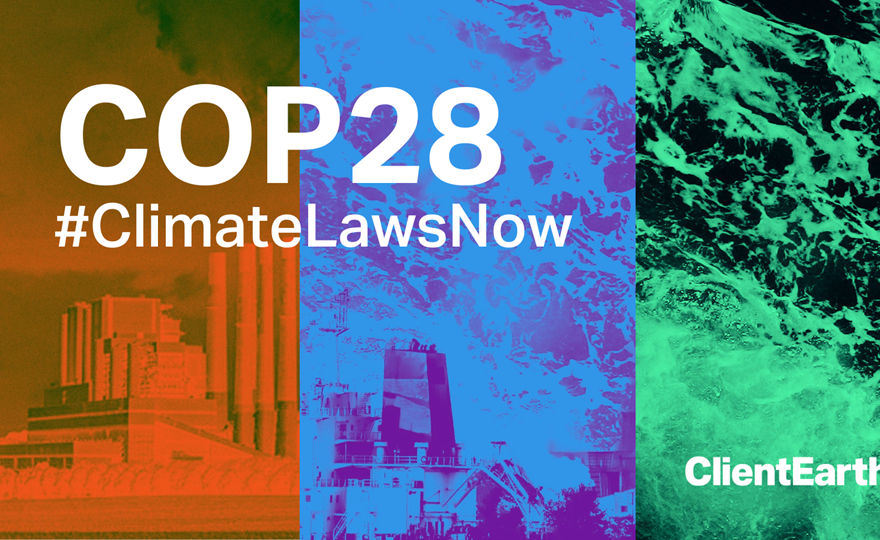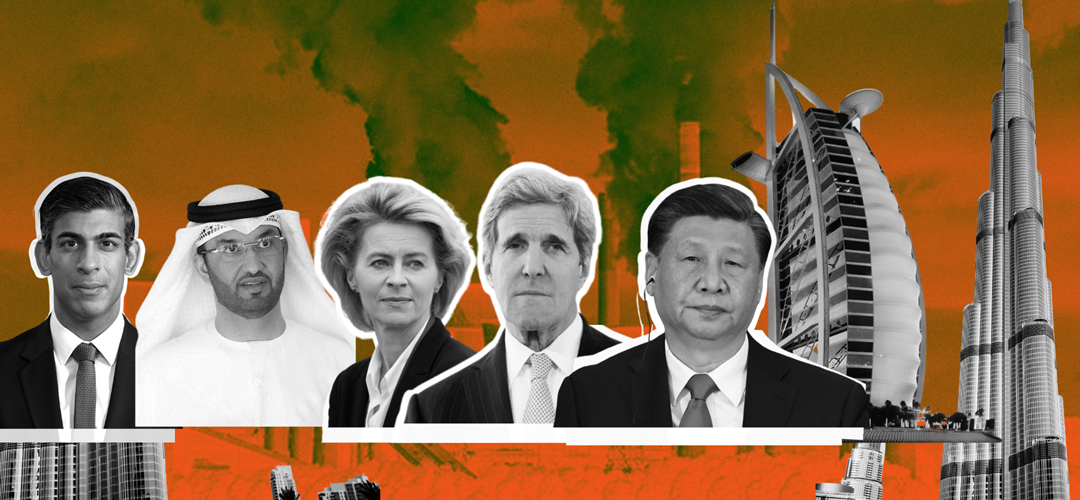ClientEarth Communications
27th November 2023


November 2023 sees the 28th COP, or Climate Change Conference of the Parties, take place in the UAE city of Dubai. As with previous COPs, global leaders from around the world will gather together to take stock of the progress (or lack thereof) made on tackling the climate crisis, and to make pledges for further progress.
COPs happen every year, and are the setting for such vital climate moments as the Paris Agreement of 2015, which opened a new international climate regime to limit global temperature increase to 1.5°C, an agreement that was underpinned by trust between the states that they would all deliver on this pledge. This year, ClientEarth will be sending a small delegation to keep an eye on the negotiations, and report back on progress made.
It’s no secret that COP28 is arguably the most controversial COP yet.
Held in a so-called ‘petrostate’ and with the head of the UAE’s state-owned oil company this year’s COP28 president, himself calling only for a reduction in overall emissions rather than the elimination of fossil fuels we so desperately need, many experts have doubt about achieving an agreement on fossil fuel phase-out this year.
In addition to this, the agreements made at previous COPs, despite the flurry of net zero pledges that happened in the wake of COP21’s Paris Agreement, have seen little in the way of meaningful progress. Many wealthy nations continue to profit from exploiting or opening new oil and gas fields, while publicly calling for swifter progress by others, including some of the less developed nations who bear the least responsibility for the climate crisis that is already hitting them hardest.
Despite 2009’s pledge from wealthy nations for a yearly $100 billion in climate finance by 2020 to help developing countries tackle climate change, nations in the global north have only just reached this target with delay.
In recent years, the EU has seen the weakening of the Nature Restoration Law, and the integration of more derogations and exemptions into EU law. There is still no consistent position on ending fossil fuel subsidies, and fossil gas has been labelled as ‘green’.
In the UK, despite hosting COP26 in 2021, there has been backsliding on commitments on electric vehicles and gas boilers. We’ve been forced to pursue a further net zero case against the UK government, as its new Net Zero Strategy is still not good enough.
The trend of backsliding and U-turning on commitments understandably throws doubt onto the validity of this and future COPs. These broken promises have weakened trust, between and within states, and caused people all over the world to lose trust in the process, and their leaders’ ability to tackle the worsening climate crisis.
So... why are we going?
Despite this somewhat gloomy outlook, we believe that COP28 is a vital tool in mobilising global action to tackle the climate crisis. Climate change is not some hazard on the far horizon; it’s happening now, and it’s impacting more people in more places around the world than ever. COP28 should be used as a desperately needed moment to galvanise innovative and bold action to break through the dangerous status quo that led us here. This is a crucial opportunity for positive, coordinated climate action on a global scale, and we must grasp it.
COP28 will also be the setting of the latest ‘global stocktake’, which occurs every five years. It is a process for countries and stakeholders to assess whether or not they’re collectively making progress towards meeting the goals of the Paris Climate Change Agreement. The COP28 global stocktake offers a critical chance to reset. It is an opportunity to accelerate climate action and ambition through international cooperation and collaboration, and holding more corporates accountable.
We need to see ambitious pledges and real, meaningful action from COP28. With so many broken promises and commitments in the wake of COPs over the years, we need states and companies to deliver on commitments like this to rebuild trust in COP and climate action, and that’s why it's so important.
Above all, we need to see radically strengthened efforts to rebuild trust in global climate action, not just through more words and promises but by real action taken to reduce emissions, build resilience, address loss and damage, and mobilise climate finance. Governments must invest money and effort into mitigation and adaptation, rather than pay much more for the devastating impacts of climate change later. And they must adopt the right policies that allow investments into green energy and phasing out fossil fuels.
This is why at COP28, we are calling for the implementation of the right rules – the right national climate laws, the right policies, the right international law initiatives – to phase out fossil fuels, support the most vulnerable communities, and secure real-world progress.
We want to see real, meaningful progress made in three key areas:
Phasing out fossil fuels and tackling greenwashing
Greenwashing – companies using advertising to present themselves as more environmentally friendly than they actually are – is on the rise. The public are being misled about the harm these companies and their products are causing. This threatens climate and economic progress, and we need to work together to ensure that bad faith actors are not the driving force behind public debate.
The science is clear: the burning of fossil fuels has devastating health, social, environmental and economic consequences. Yet the fossil fuel industry relies heavily on PR, advertising, and sponsorship to mislead the public – and decision-makers - about the harm these companies and their products are causing.
Governments must implement the right rules and policies to end corporate greenwashing, so that companies are no longer able to mislead the public about their sustainability, and efforts can be made to reduce fossil fuel demand.
Climate Laws
Following on from COP28, we need to see nations adopt ambitious, progressive and science-driven climate laws to implement the commitments they made as part of the Paris Agreement, by COP30. These laws should include interim and long-term targets that require absolute reductions of all national greenhouse gas emissions.
Practices must also change so that states are obligated to take national climate targets and the best available climate science into account in their decision-making, particularly when it comes to new infrastructure, and public investment and support.
Supporting those most vulnerable to climate change
There are three advisory opinions pending before international courts and tribunals: the International Court of Justice (ICJ), the International Tribunal on the Law of the Sea (ITLOS) and the Inter-American Court of Human Rights (IACtHR), all seeking clarification on big legal questions about how States should deal with climate change under international law.
These signify the next step of progress on international climate cooperation: after developing international processes and rules for climate action, it is now time for legal interpretation by the courts.
COP28 is a watershed moment for international law to develop on climate change and determine how the international legal framework accounts for the rights of the most affected small island states and communities.
